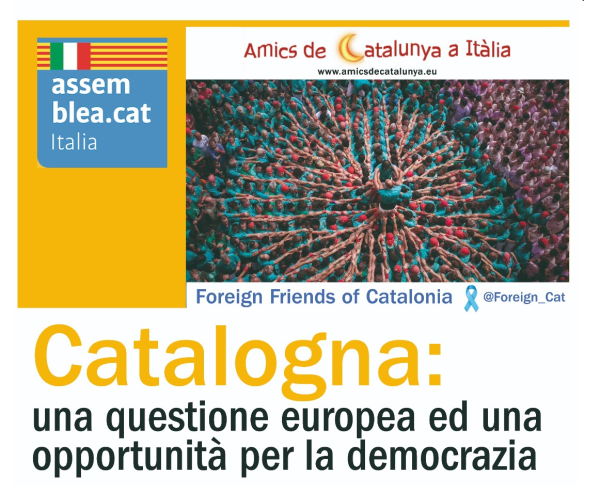
After Catalan National Assembly (ANC) President Elisenda Paluzie’s visit to the French parliament last Tuesday, the ANC is continuing the work of internationalising the Catalan independence process.
On Wednesday, 4 July, ANC Italy presented a discussion on European involvement in the Catalan process and the importance of finding a democratic solution to the conflict. The conference—”Catalonia: A European Issue and an Opportunity for Democracy”—was held within the framework of an event entitled “Dall ’Euroall’ Europa Federale”, in collaboration with Friends of Catalonia Italy and Foreign Friends of Catalonia.
The meeting in the university city began with a presentation on Catalan politics and current affairs by Jaume Bardolet, coordinator of the ANC’s International Impact Committee. A video message from the legitimate president of the Catalan Republic, Carles Puigdemont, was then shown, followed by the screening of a documentary on the 1 October self-determination referendum (with Italian subtitles).
The documentary was the starting point for a discussion among experts, academics and writers on the referendum, the repression that followed, and the history and future of the Catalan conflict, which, according to ANC Italy, should be framed not as a problem, but as an opportunity for democracy and the future of Europe.
The participants in the discussion were Elena Marisol Brandolini, Barcelona correspondent for Il FattoQuotidiano, who took advantage of the occasion to present her book Piolínimbavagliato: Cronacadell’autunnocatalano (“Tweety Gagged: Chronicle of the Catalan Autumn”); Bobo Craxi, former Italian Undersecretary for Foreign Affairs and author of Lettere da Barcellona (“Letters from Barcelona”); Francesco Olivo, journalist with La Stampa; and Patrizio Rigobon, professor of Catalan Language and Literature at Ca’ Foscari University.
The discussion was moderated by journalist Lluís Cabases.
Strong condemnation of violence
Patrizio Rigobon stressed the peaceful, civic character of the Catalan independence movement. “Nations are built on blood, through fighting, everyone says.” Rigobon said he had seen a people “educated in non-violence, in civicism, to resist the tradition of violent nationalism”.
The participants all condemned the violence employed by the Spanish state on 1 October. They were also unanimous in their indignation at the Spanish government’s inability to find a political solution to a political problem.
The Catalan community also paid tribute to the victims of the terrorist attack that took place in Bologna on 2 August 1980 and advocated for a culture of peace.